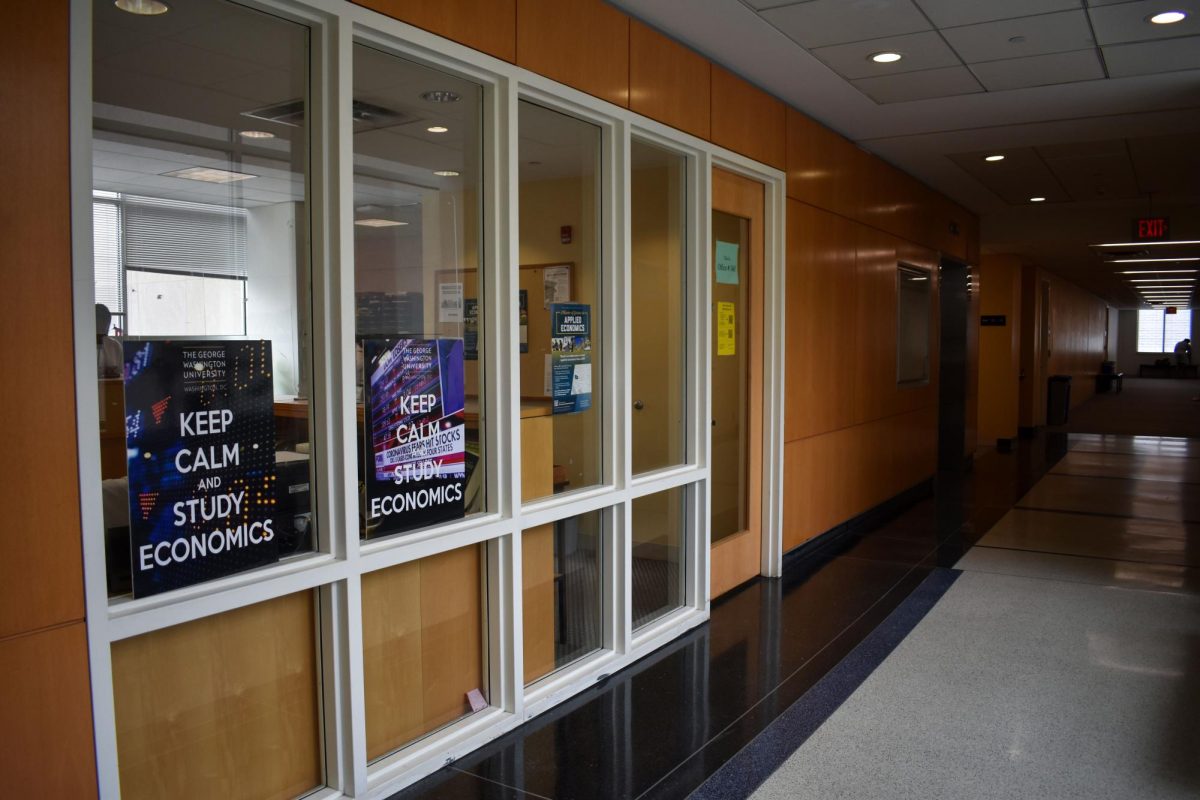Economics professors are grappling with a slip in grades in introductory courses, searching for ways to better engage students amid a national drop in academic performance.
Economics faculty said national dips in performance stemming from pandemic school closures accelerated the already growing number of students struggling in Principles of Economics I, or ECON 1011, and Principles of Economics II, or ECON 1012. A large cohort of students — those studying international affairs and business, in addition to economics students — need to pass the courses to graduate, and professors are using proctored placement tests and feedback on class structures in an effort to keep them afloat.
“I know the University is very worried,” said Roberto Samaniego, a professor of economics and international affairs. “We are worried. We’re trying to figure out what to do. The University is asking us what we’re doing.”
From 2018 to 2022, the number of students who passed the ACT math benchmark that classifies them as “ready” for college-level math dropped from 40 percent to 31 percent. Samaniego said the department is identifying where students need more academic support by asking them for feedback on what content is most challenging and suggestions on what changes they want to see made to the two classes.
The department kicked off the effort with a survey sent to students who took a principles of economics course last academic year in August, asking them to assess their professor and the difficulty of lectures and assessments. The survey, which closed last month, also asked students for their intended major, what high school math and economics classes they took, if they plan on taking additional economics courses and what advice they have for improving the class.
“Everything is on the table if we think it’s something that would work for improving student experience and learning in both classes,” Samaniego said.
Samaniego said faculty already identified low attendance rates as one reason why students are struggling. He said the number of absences in his principles of economics lectures last semester were “shocking” and contributed to poor grades because the material is cumulative, which makes recovering from missed lectures difficult.
“The absentee rates in lecture and in discussion sections was something I’d never seen before,” Samaniego said. “Maybe half in the lecture and less than half in the discussion section.”
Samaniego said there has also been an “internal investigation” into the varying levels of difficulty among professors that teach the two courses to see if students struggle with certain professors more than others. He said he has not seen the survey’s results but wants to know where he stands relative to other professors because the course survey he gives his students does not address variation in difficulty across sections.
“The difference is my course evaluation doesn’t tell me where I am compared to others,” Samaniego said.
Economics faculty also said inaccurate placement test scores may contribute to students taking the two classes before they’re ready. In response, the economics department mandated incoming first-year students who desired to register for Principles of Mathematics for Economics — also known as ECON 1001 — or ECON 1011 to take an in-person, proctored version of the ALEKS placement test — an assessment STEM departments use to determine which course level students are ready for — on Aug. 20.
In previous years, students could access the ALEKS placement through a link on the economics department’s website and take the test without a proctor at any time of day.
Daniel Mackay, an assistant professor of economics, said more students scored poorly on this year’s proctored test than previous years and estimated that “between 300 and 400” students who intended to take Principles of Economics scored below a 61, the threshold score to register for the course. He said students who failed to exceed the threshold could either forgo taking the class or enroll in ECON 1001, the lowest-level economics course.
Anthony Yezer, a professor of economics, said the department began proctoring placement tests because many students scored higher than the 61 percent threshold when they took a proctorless version of the exam but lacked the math skills once in class. If the placement test truly reflected students’ competency in necessary math concepts, the test would have placed roughly 30 percent of the students in his Principles of Economics I class in Principles of Mathematics for Economics instead, Yezer estimated.
“We found that large numbers of students who scored well above 61 during the summer when they were unproctored, when they came here and they were proctored it was not so good,” Yezer said.
Yezer said he is concerned it will be difficult to interpret the department’s survey results because many students who took Principles of Economics I last year struggled and should have taken Principles of Mathematics for Economics first.
“To an extent, a lot of the students who are responding are the students who probably shouldn’t have been in 11 to begin with, and it makes it a bit difficult to conclude much,” Yezer said.
Yezer said declining math competency rates among incoming students became apparent in the principles of economics classes. He said COVID caused drops in understanding because students retained less knowledge while learning it virtually.
“Economics 11 is not a course for people who can’t recall their seventh-grade math. But for those who can recall their seventh-grade math, it’s not very difficult at all,” Yezer said.





